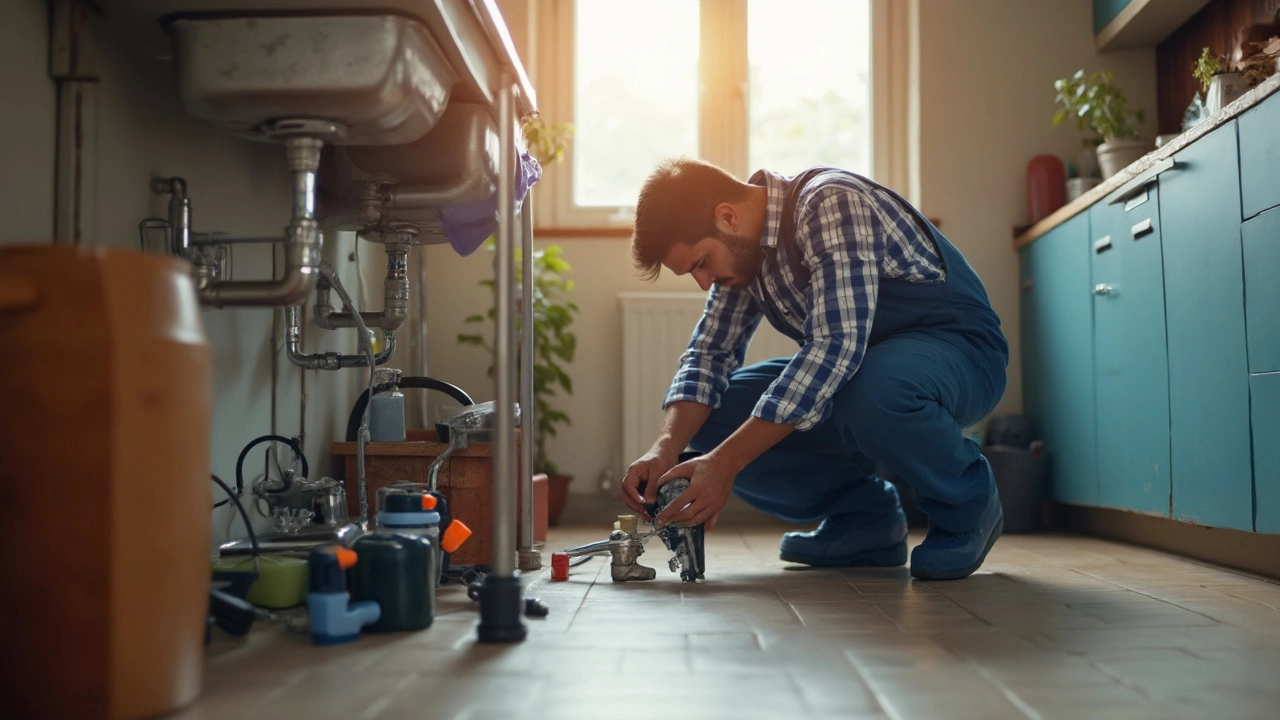If you picture a plumber spending all day fixing toilets, you're not alone. Actually, the single most common job for a plumber is repairing leaks in residential homes. Pipes under the kitchen sink, a dripping bathroom tap, or a slow leak inside a wall—these are daily bread for trained plumbers. Sure, you might occasionally land a big job like installing a hot water system, but most calls are about something that just won't stop leaking.
This isn’t as boring as it sounds. Every leak is a puzzle. Some hide behind tiles, some spring in older copper piping, and others show up as a damp patch in a bedroom. The best plumbers don’t just replace washers—they figure out why leaks happen in the first place. That kind of skill keeps customers coming back and stops those midnight callouts—everyone’s nightmare.
- What Plumbers Really Do Most Days
- Why Residential Repairs Dominate
- Skills that Make You Stand Out
- Tips to Land Your First Plumbing Job
What Plumbers Really Do Most Days
Ask any plumber what fills up their schedule, and they'll point right to everyday home repairs. You’d be surprised how many houses develop small plumbing problems every single week. The most common plumbing work is fixing leaks and unclogging drains, especially in kitchens and bathrooms. It sounds simple, but there’s real skill behind sorting out a slow kitchen sink or a shower that won’t stop dripping.
Studies in the UK and Australia found that about 70% of all residential plumbing call-outs are for minor repairs, not big installations. Plumbers spend a lot of time:
- Replacing worn washers or faulty taps
- Clearing blocked toilets or drains
- Fixing or replacing leaking pipes under sinks
- Repairing faulty valves on hot water tanks
It’s not all glamorous, either. Sludge, rusty water, and mystery smells are just part of the job. If you like solving real-life mysteries, you’ll actually enjoy it. But most days don’t involve bathroom makeovers or fancy kitchen installs—that’s a small part of real plumber life.
Take a look at what a week might look like for an average plumber based on a 2024 trade survey:
| Job Type | % of Weekly Calls |
|---|---|
| Leak repairs | 35% |
| Blocked drains/toilets | 25% |
| Tap/shower repairs | 18% |
| Hot water issues | 10% |
| Pipe installations | 7% |
| Heating problems | 5% |
The takeaway? If you’re after a steady line of work, and you’re hands-on, these jobs are always waiting. Fixing problems for everyday people never goes out of style, and in most places, demand for repairs keeps growing as old houses and pipes wear out.
Why Residential Repairs Dominate
Most people don’t realize that over 85% of a plumber’s daily work is done in people’s homes, not big factories or construction sites. Residential plumbing is the backbone of the trade, mainly because homes are packed with miles of water lines, dozens of fixtures, and a crazy mix of old and new equipment. Stuff breaks, people panic, and plumbers are called to fix leaks that seem to pop up at the worst possible time.
Families use kitchens and bathrooms every single day, so even a small problem can’t wait. A leaky pipe under the kitchen sink can waste up to 3,000 gallons of water each year. That's not just annoying—it can crank up the water bill and even mess up your cabinets or floor. This keeps the phones ringing for plumbers all around the world.
Most common residential plumbing calls break down like this:
- Leaky pipes or joints
- Dripping taps and faucets
- Blocked or slow drains
- Toilet flush problems
- Water heater issues
Take a look at the raw numbers from a 2024 industry survey:
| Repair Type | % of Calls |
|---|---|
| Leaky pipes | 32% |
| Blocked drains | 28% |
| Toilet repairs | 18% |
| Water heater repairs | 12% |
| Other | 10% |
Residential jobs also tend to be shorter and simpler than big commercial gigs. You can finish two or three smaller repairs in a day, which is handy if you’re just starting after your plumber job certification. More jobs mean more chances to learn, build your confidence, and prove yourself to new customers.
One more thing: homeowners expect fast, friendly service. If you show up on time, explain things in plain English, and clean up after yourself, people remember you—and that leads to repeat business. That’s a big reason why residential work continues to dominate the industry.

Skills that Make You Stand Out
If you want to be more than just another plumber, you've got to develop a few key skills that go beyond just tightening pipes. It starts with customer service. Homeowners care less about your wrench and more about how easy you make their life. Show up on time, explain the problem in plain English, and charge what you promised — simple stuff, but so many people mess this up.
Plumbing tech moves fast these days. If you know how to use leak detection gadgets, read electronic plans, or even use plumbing software, you already have an edge. A lot of newer training courses now cover how to spot leaks using thermal cameras or sound sensors. What’s cool is, you don’t even have to guess where a leak is hiding anymore — the tools can tell you before you wreck anyone’s tiles.
Another skill? Problem-solving. Leaks rarely show up where the water actually escapes. Being able to trace the source quickly and identify hidden problems — maybe tree roots, bad pipe joints, or dodgy previous repairs — can save you hours. The best plumbers ask questions and think a few steps ahead.
- Get proper certifications. People trust plumbers who can show real credentials, not just a toolbox.
- Stay up-to-date on local codes — rules change, and you don’t want a failed inspection wiping out your pay for the week.
- Practice safe work habits. Good plumbers don’t cut corners when it comes to protective gear, especially with things like soldering and chemical cleaners.
- Keep learning. New parts and solutions show up every year. Those who rely on what they learned ten years ago get left behind fast.
Finally, if you want steady work, get some basic skills with gas appliances or water heaters. Many homeowners want a plumber who can fix a plumber job like a kitchen leak in the morning and quickly check a faulty boiler in the afternoon. The more you can do, the more valuable you are — simple as that.
Tips to Land Your First Plumbing Job
Getting your first plumbing gig feels impossible until you see how others have done it. In 2024, around 80% of new plumbers got hired within four months of finishing their training. If you want a head start, follow these steps and skip the mistakes most rookies make.
- Build hands-on experience early: Don’t wait till you have your licence to get your hands dirty. Volunteer to shadow a local plumber or ask your training centre for work placements. Most plumbing companies want someone who knows their way around real tools, not just textbooks.
- Get certified and show it: Employers expect you to finish a certified plumbing course and pass your trade exam. Keep copies of your certificates and a clean, simple CV ready. If you have extra safety tickets (like a White Card for construction work), that’s a huge plus.
- Network from day one: More than half of first jobs come from word of mouth. Make friends during training, connect with trainers, and even chat with supply shop staff—they hear about job leads all the time.
- Don’t ignore small businesses: The big companies get swamped with applications. Smaller plumbers or local operators are often looking for an extra pair of hands, especially during peak season. Drop by in person with your CV, not just an email.
- Polish up your tech skills: These days, plumbers use tablet apps for job logs and digital invoicing. If you can show you’re good with both wrenches and wifi, you’ll stand out.
If you’re wondering what helps most, take a look at how new plumbers snagged their first jobs just last year:
| Method | % of Hires (2024) |
|---|---|
| Industry connections (networking) | 55% |
| Direct application | 25% |
| Work placement from training | 15% |
| Job ads (online/offline) | 5% |
The single most important thing is to go after every possible opening and let everyone know you’re keen. Getting your first break in the plumber job market is about hustle, skill, and keeping your ear to the ground. Once you're in, it only gets easier.


